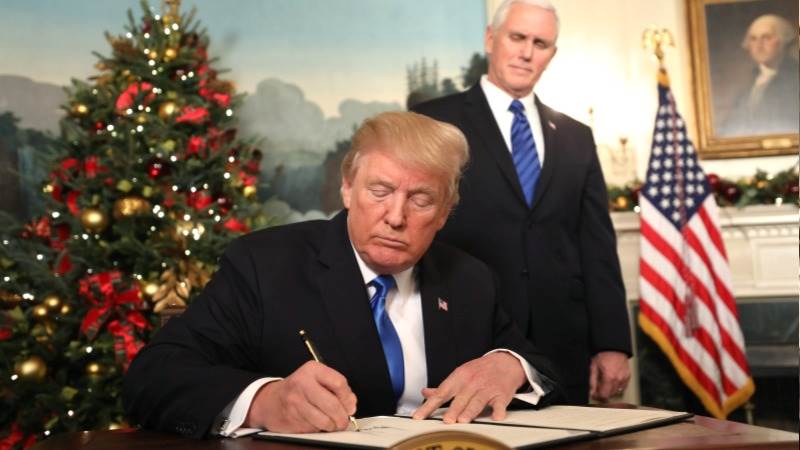On this day six years ago, the 45th president of the United States Donald Trump made one of the most significant moves which marked a historic shift from Washington's policy on Israel and Palestine by declaring Jerusalem as the capital city of Israel and announcing plans to relocate the US embassy from Tel Aviv.
This decision, while applauded by Israel, sparked condemnation from Palestinian leaders and much of the international community. Israeli Prime Minister Benjamin Netanyahu hailed the announcement as a "historical landmark." Meanwhile, Palestinian leaders, including President Mahmoud Abbas and then-Prime Minister Rami Hamdallah, criticized the US policy change, stating that it undermined the peace process and Washington's role as a peace mediator in the Israel-Palestine crisis.
"I've judged this course of action to be in the best interest of the United States of America and the pursuit of peace between Israel and the Palestinians," Trump stressed in his formal address on December 6, 2017. However, Trump clarified that the decision did not resolve the ongoing dispute over Jerusalem's borders, with Palestinians and a number of countries recognizing East Jerusalem, which was held by Jordan after the 1948 Arab-Israeli War, as the capital of a future Palestinian state. "Those questions are up to the parties involved," Trump pointed out.
With the transition to the Biden administration in 2021, all eyes were once again on Washington and how the new leadership would approach the question of Israel and Palestine, especially in the aftermath of Trump's decisions. President Joe Biden, while not reversing the recognition of Jerusalem, emphasized a commitment to a two-state solution as determined by the United Nations resolution in 1947. In the early days of his office, Biden was put to the test in May of the same year with the start of fighting between Israel and Hamas in Gaza. The administration reaffirmed Washington's "ironclad support" for Israel and its right to defend itself, though it continued to call for a ceasefire and emphasized the need for diplomacy to address the root causes of the conflict.
The Biden administration also resumed humanitarian aid to the West Bank and the Gaza Strip, a policy halted by the Trump administration in 2018. The tensions between Israel and Hamas culminated once again on October 7, which led to a full-scale war between the two sides, claiming thousands of lives. Despite the escalation, the Biden administration reiterated its support for the creation of two independent states but also backed Israel in its fight against Hamas.




